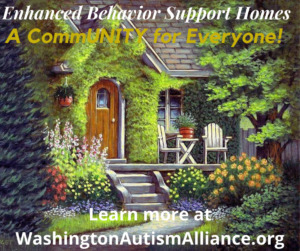Share Your Story of Why EBSH is Needed in Washington State
Hello from all of us at Washington Autism Alliance’s Enhanced Behavior Support Homes (EBSH) Campaign! Our core workgroup has been preparing for a successful effort in getting the Enhanced Behavior Support Homes Bill passed and adequately funded in the coming 2023 Legislative Session, and we are ready to call our Enhanced Behavior Support Homes Coalition Group back into action. This is your call to action!
To refresh your memory, Enhanced Behavior Support Homes, which has been successfully implemented in California and subsequently several states following California’s lead, provides 24-hour non-medical care, staffed by behavior technicians, and overseen by behavior specialists and psychiatric providers. These homes support both youth (who are currently being sent out of state to therapeutic boarding schools) and adult IDD persons with significant behavioral challenges to live safely in the community.
Last year we invited you to fill out our EBSH Survey, where you shared with us your personal and/or professional interest in advocating for a long-term, therapeutic, community-based residential model intended to serve adult and/or adolescent individuals with IDD and or ASD who have significant behavioral support needs. (If you have not filled out the EBSH Survey, and are interested in learning more about this effort, please do so!) Since that time, we have continued to spread awareness about the need for a residential solution for individuals with support needs greater than what the current residential options can provide. We have continued to speak to Washington State Legislators, Advocacy Groups, DDA and Health Care Authority Leadership, Healthcare Associations, etc and continue to gain support for the EBSH Bill.
What we need more of right now, is for our Legislators and State Policy Makers to hear from YOU. Our lawmakers understand that we are in a crisis, as they understand the impacts to our state’s “systems.” But in order for them to act, they need to see the individuals and families behind this data. They need to understand that this isn’t a “growing crisis”, but a crisis that has consumed so many families for so many years. They need to hear what it is like, day after day, year after year, to live through this crisis. They need to hear from everyone that is impacted by this continued gap in accessible, appropriate, long-term, community-based, therapeutic, residential services for our community’s MOST vulnerable.
This is our current Call to Action: We Need You to Share Your Stories.
We need to hear more of your stories showing the PEOPLE behind this crisis: resilient warriors who are battle-worn, exhausted, and running out of hope in ensuring their family member’s long-term safety and care. We have developed a series of questions intended to show decision makers all the ways this crisis is showing up in our state. Some examples of these questions include:
- Can you share a snapshot of your family member’s life when they had the highest quality of life? What supports were in place that helped them to thrive? (ex. school, therapies, family relationships, social relationships, recreational activities, accessible hobbies, etc.)
- At what point did life become more challenging for them and for those caring for them? What do you think contributed to a decrease in their quality of life (ex. due to a loss of services, relationships, out of school, etc?)
- What is your loved one’s current living situation (i.e. are they living at home, are they in supported living or SOLA, are they in a hospital or an RHC/ICF?) What is and isn’t working?
- What vision does your family member (and those that care for them) have for living their best life? What can our state and community do to help them live that vision?
There are many ways to share your family’s story. Because everyone has their own level of comfort in how their stories are told, we have multiple options in format/visibility such as:
- A Zoom interview with WAA/EBSH staff, edited to short video (you can choose to be on camera, have your voice only, or have your interview transcribed with another voice reading your words).
- Written response to questions we provide, edited to short text-only video and/or written testimony
- Sharing your testimony in private or full-legislative session meetings with legislators
For any and all story-telling options we will provide you with the full list of questions in advance to give you time to think about what you wish to share. Both written and video testimonies can include personal photos or can be as anonymous as you are comfortable with. We are here to support you in any way that helps you get your story told.
We thank you for your continued support as we work to bring the Enhanced Behavior Support Homes Model to Washington State.
Please send us an email at [email protected] if you are willing to share your family’s story of trying to access safe, long-term, community-based, therapeutic residential services for a family member with autism and/or IDD and challenging behaviors.
To learn more and get involved in this effort, fill out our EBSH Survey*!
(*Note, if you have already fill out this survey, you do not need to fill it out again)


